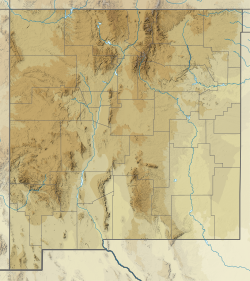Sevilleta Metarhyolite
| Sevilleta Metarhyolite | |
|---|---|
| Stratigraphic range: | |
 Sevilleta Metarhyolite west of Abo Pass, New Mexico, US | |
| Type | Formation |
| Unit of | Manzano Group |
| Underlies | Abajo Formation |
| Overlies | Bootleg Canyon Sequence |
| Thickness | 4,500 ft (1,400 m) |
| Lithology | |
| Primary | Rhyolite |
| Other | Schist, amphibolite |
| Location | |
| Coordinates | 34°24′29″N 106°31′30″W / 34.408°N 106.525°W |
| Region | Los Pinos Mountains, New Mexico |
| Country | United States |
| Type section | |
| Named for | Sevilleta land grant, Socorro County, New Mexico |
| Named by | Stark and Dapples |
| Year defined | 1946 |
The Sevilleta Metarhyolite (or Sevilleta Formation) is a geologic formation in central New Mexico. It has a radiometric age of 1665 ± 16 Ma, corresponding to the Statherian period.
History of investigation
[edit]The unit was first defined by Stark and Dapples in 1959, during their mapping of the Los Pinos Mountains, as the Sevilleta rhyolite.[1] Condie and Budding called the unit the Sevilleta Formation in their 1979 work.[2] Bauer and Pollock called the unit the Sevilleta metarhyolite in their compilation of radiometric ages in 1993.[3]
Geology
[edit]The unit is a thick sequence of interbedded metarhyolites, pelitic schists, and amphibolites. The metarhyolite making up the bulk of the unit is a tan to dark red, glassy, fine-grained metarhyolite with abundant potassium feldspar phenocrysts. The modal composition is 25% quartz, 30% plagioclase, 40% potassium feldspar, 1% muscovite, 1% biotite, 1% epidote, 1% oxides, and 1% accessory minerals. Accessory minerals include actinolite, chlorite, carbonate minerals, and zircon. Radiometric ages range from 1658 Ma to 1670 Ma with a consensus age of 1662±1 Ma.[4]
The formation is included in the Manzano Group. It overlies the Bootleg Canyon Sequence and is in turn overlain by the Abajo Formation.[5]
Similar beds are found in the Hells Canyon area of the northern Manzanita Mountains (34°53′31″N 106°24′11″W / 34.892°N 106.403°W) and the Monte Largo Hills (35°10′59″N 106°16′41″W / 35.183°N 106.278°W). However, the Hells Canyon outcrops may be older than the main exposures of the unit. [4]
The unit is interpreted as a product of caldera eruptions associated with the Mazatzal orogeny.[6]
Footnotes
[edit]References
[edit]- Bauer, P.W.; Pollock, T.R. (1993). "Compilation of Precambrian isotopic ages in New Mexico" (PDF). New Mexico Bureau of Mines and Mineral Resources Open File Report. 389. Retrieved 3 June 2021.
- Condie, K.C.; Budding, A.J. (1979). "Geology and geochemistry of Precambrian rocks, central and south-central New Mexico". New Mexico Bureau of Mines and Mineral Resources Memoir. 35. Retrieved 3 June 2021.
- Holland, Mark E.; Grambling, Tyler A.; Karlstrom, Karl E.; Jones, James V.; Nagotko, Kimberly N.; Daniel, Christopher G. (September 2020). "Geochronologic and Hf-isotope framework of Proterozoic rocks from central New Mexico, USA: Formation of the Mazatzal crustal province in an extended continental margin arc". Precambrian Research. 347: 105820. doi:10.1016/j.precamres.2020.105820.
- Grambling, Tyler A.; Karlstrom, Karl E.; Holland, Mark E.; Grambling, Nadine L. (2016). "Proterozoic magmatism and regional contact metamorphism in the Sandia-Manzano Mountains, New Mexico, USA" (PDF). New Mexico Geological Society Field Conference Series. 67: 169–175. Retrieved 27 May 2020.
- Stark, J. T.; Dapples, E. C. (1946). "GEOLOGY OF THE LOS PINOS MOUNTAINS, NEW MEXICO". Geological Society of America Bulletin. 57 (12): 1121. doi:10.1130/0016-7606(1946)57[1121:GOTLPM]2.0.CO;2.


